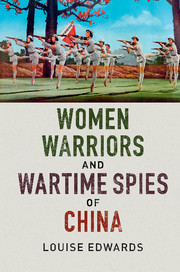Book contents
- Frontmatter
- Dedication
- Contents
- List of Figures
- Acknowledgements
- Chronology
- 1 Soldiering, war and gender in China
- 2 The archetypal woman warrior, Hua Mulan: Militarising filial piety
- 3 Qiu Jin: Transitioning from traditional swordswoman to feminist warrior
- 4 Xie Bingying opening public spaces to women Fighting patriarchy and fighting militarists
- 5 Aisin Gioro Xianyu: ‘Joan of Arc of the Orient’ or ‘Mata Hari of the East’?
- 6 Guerrilla resistance leader, Zhao Yiman: Warrior teacher and self-sacrificing CCP mother
- 7 Negotiating sexual virtue: The glamorous, honey-trap spy, Zheng Pingru
- 8 Ding Ling and Zhenzhen: Female chastity and good communist governance
- 9 Mobilising and militarising rural China through the girl martyr, Liu Hulan
- 10 Women warriors and wartime spies as tools for ‘total militarisation’: The Red Detachment of Women
- Notes
- Bibliography
- Index
1 - Soldiering, war and gender in China
Published online by Cambridge University Press: 05 March 2016
- Frontmatter
- Dedication
- Contents
- List of Figures
- Acknowledgements
- Chronology
- 1 Soldiering, war and gender in China
- 2 The archetypal woman warrior, Hua Mulan: Militarising filial piety
- 3 Qiu Jin: Transitioning from traditional swordswoman to feminist warrior
- 4 Xie Bingying opening public spaces to women Fighting patriarchy and fighting militarists
- 5 Aisin Gioro Xianyu: ‘Joan of Arc of the Orient’ or ‘Mata Hari of the East’?
- 6 Guerrilla resistance leader, Zhao Yiman: Warrior teacher and self-sacrificing CCP mother
- 7 Negotiating sexual virtue: The glamorous, honey-trap spy, Zheng Pingru
- 8 Ding Ling and Zhenzhen: Female chastity and good communist governance
- 9 Mobilising and militarising rural China through the girl martyr, Liu Hulan
- 10 Women warriors and wartime spies as tools for ‘total militarisation’: The Red Detachment of Women
- Notes
- Bibliography
- Index
Summary
Women soldiers and wartime spies challenge foundational gender norms in their daring deeds and dramatic actions – so it is little wonder that stories about women's involvement in wartime action attract instant popular interest all around the world. The vision of a woman killing another human being affronts long-held views about women as life-givers rather than harbingers of death. Envisioning female bodies in military uniforms challenges normative ideas about feminine beauty and grace. Contemplating women risking their lives undermines the notion that such courage is primarily a manly attribute. Imagining the adventures of the beautiful and sexy undercover agent thrills audiences as they see conventional sexual morays crumble in the face of service to the nation. How can a woman kill? How can she lead in battle? Will she have the courage to fight? How can she sacrifice her virtue to trade sex for secrets?
In China the popular fascination with women who go to war has existed for centuries. They filled the pages of classical novels, frequently appeared in operas and plays, and in our current-era populate movies, television series, propaganda posters, computer games and schoolbooks. Interest in women warriors and wartime spies shows no sign of abating in the twenty-first century despite the dramatic changes in gender norms that have occurred during the last 100 years. All around the world, including China, women have become politicians, bankers, lawyers, teachers, landowners and scientists – roles previously prohibited to them. But none of these roles generates as much fascination as women's participation in warfare and espionage. In many countries, the armed forces remain one of the few professions where biological sex can still determine the nature of duties assigned – women are frequently prohibited from front-line combat. The People's Republic of China (PRC) is one such nation that limits women's combat roles – despite the extensive promotion of women as active war fighters in public narratives. This phenomenon tells us that war fighting continues to be intimately linked to notions of maleness and masculinity in ways that teaching, banking or administering are not.The symbolic power of the woman war fighter reveals that war and militarised violence continues to be structured around gender norms – indeed war needs gender norms to continue its logic. Conventional, some would say outdated, gender norms help governments and armed groups present war as an attractive option for conflict resolution to ordinary citizens.
- Type
- Chapter
- Information
- Women Warriors and Wartime Spies of China , pp. 1 - 16Publisher: Cambridge University PressPrint publication year: 2016



